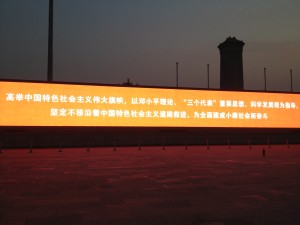The group blog East by Southeast, curated by my friend Brian Eyler, director of IES Kunming, has published an article I wrote. Here it is reproduced.
Just outside of Yangon lies the “National Races Village,†a park laid out as a geographical representation of Myanmar, with real-sized model minority homes dotted around the park next to miniature lakes and mountains. The park feels quite similar to the Chinese Ethnic Culture Park in Beijing; both represent slightly bizarre attempts to paper over inter-ethnic conflict, as if both countries are trying to live out some sort of “big socialist family†of yesteryear.
Unfortunately Myanmar also seems to have copied much of China’s policies towards ethnic minorities. Sixty years ago, China promised its ethnic minorities that if they cooperated with the CCP, they would be granted self-autonomy. Myanmar promised the same thing in the form of the 1947 Panglong Agreement, which called for power sharing between the majority Bamar and ethnic minority groups. Both countries failed to live up to their promises. In China, the CCP has engaged in a campaign to eradicate traditional cultures and languages, and has kept minority areas under tight control by party officials. In Myanmar, Ne Win’s military coup in 1961 gave rise to centralized, authoritarian control, and to ethnic rebel groups who fought the military for decades.
But China hasn’t just been a bad model for Myanmar to follow; in fact, China’s involvement in Myanmar has directly contributed to bad ethnic relations and violence there. Most prominent is China’s long support for the United Wa State, previously known as the Burma Communist Party (BCP). China’s support for the BCP began under Mao as an armed insurgency against the Tatmadaw, the Burmese military. After the BCP collapsed in 1989, the organization was retooled as the United Wa State Party (USWP) and Army (USWA), and signed a ceasefire agreement with the Myanmar government. It also transformed itself from a revolutionary group into the largest drug-trafficking organization in all of SE Asia and one of the biggest heroin producers in the world. To this day, China has continued to fund and arm this practically-Chinese private militia, which organizationally seems to model itself after the CCP and draws off of Chinese electricity, cell phone service, etc. If anything, China’s support for the USWA has only intensified in recent years, because it wants to retain its influence in Myanmar and does not want the USWA to be defeated by the Tatmadaw, as it seems the Kachin Independence Army (KIA) will inevitably be. Just recently it was reported that China has provided the USWA with helicopters armed with air-to-air missiles.
And what of China’s efforts earlier this year to facilitate a ceasefire agreement between the Myanmar government and the KIA? China is playing multiple games here. It wants Myanmar to be stable enough so that its state-owned corporations can successfully strip the country of its natural resources, but it doesn’t want the country to adopt wholesale political reconciliation, lest its contracts come under scrutiny and it gets kicked out of the country. Like many of China’s actions, this is a shortsighted move to retain influence; the long-term effects are counter to China’s actual interests. China sees only the current resource-extraction deals it has with the government, and the potential cancelation of such deals if the Burmese people, including ethnic minorities, have a greater say in that government’s policies. But what it does not seem to see is that as Myanmar’s GDP per capita rises from its current abysmally low figure, China is going to be Myanmar’s main source of finished products and investment capital. If China continues on its current path, then the Myanmar people, who are already fed up with China’s exploitative practices, will protest and force a change in the situation. In that situation, China would massively lose. This possibility is especially unfortunate given how much China could gain from a prosperous Myanmar, and how positively China could influence the country.
If China cooperates, it would be difficult, but not impossible to negotiate a Panglong 2 Agreement implementing political reconciliation. The current government insists that any political reform operate under the current constitution, which is still heavily biased towards the military and wouldn’t be a good framework for a federal governmental structure. In addition, Aung San Suu Kyi is not universally liked by ethnic minorities nor seen as their democratic savior; she is mainly a Bamar political figure. But the current government also realizes that if Myanmar does not deal with its ethnic problem, then the West will sour on Myanmar’s reform and the prospects for economic growth will wither away. This is a strong positive incentive to get it right. Let’s hope China agrees.
